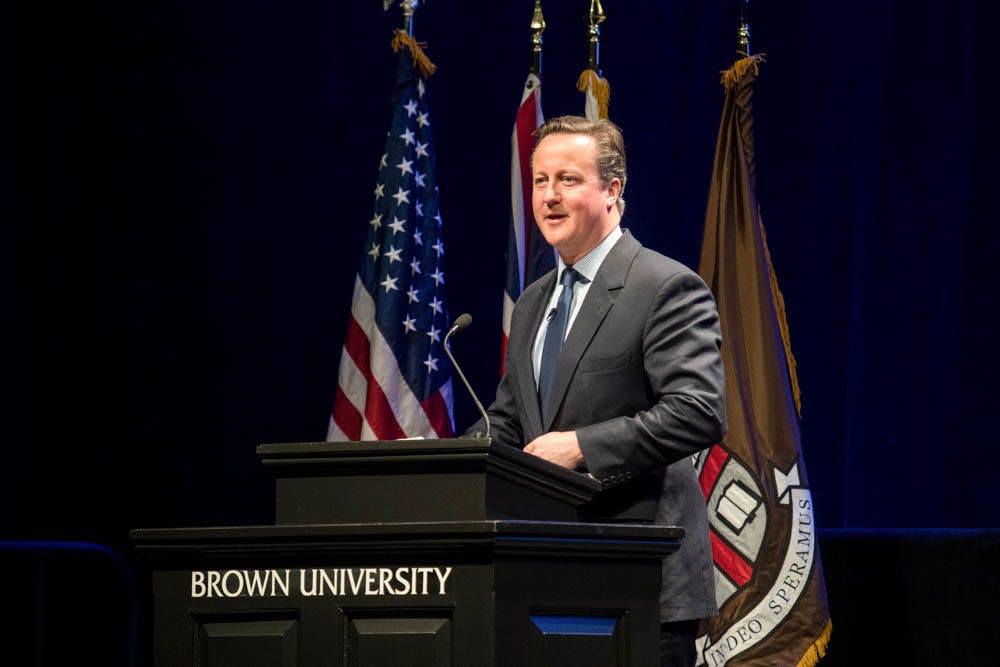Former Prime Minister of the United Kingdom David Cameron delivered a lecture Monday in the latest iteration of the Ogden Lectureship.
The lecture, titled “Contemporary Global Challenges: Where Do We Go From Here?,” focused on a recent trend of populist, nationalist events — the United Kingdom’s referendum vote to leave the European Union and President Trump’s election, specifically — and the underlying causes behind them and the next steps necessary to reverse the trend.
“Not being Prime Minister has some compensation,” Cameron said, taking the stage after an introduction from Christina Paxson P’19. “I don’t have to listen to (Trump’s) wiretaps,” he joked, before angling his humor towards the Brown community, pointing out Britain has “never had a nudity festival in the House of Commons” and tracing the roots of post-truth politics and fake news to former Professor of Psychoceramics Josiah Carberry.
But the lecture quickly took a serious turn. “The benefits of globalization are still plain to see,” Cameron said. But a serious “course correction” is needed, he added.
Two main reasons behind recent political movements are economic and cultural, he said. Too many people have been left behind economically — a rising tide has not lifted all boats, he said. Culturally, Cameron cited a pace of change too fast for some people to keep up with.
“If we don’t address the problem of people left behind economically, they will fall prey to the far left, and socially, the far right,” Cameron said. He added that responsible capitalism — characterized by tax, trade and transparency — will make globalization better and fairer for all involved.
As Cameron shifted from the underlying causes behind the current political climate to the future, he extolled the necessity to “remake arguments all over again for values we have.” Free trade and the growth of world trade have not made countries poor, they have made them rich, he said. After Trump’s election, it is arguments like this that need to be remade, he said.
America will not be made “great again by making Eastern Europe weak again,” Cameron said, speaking on the need to support NATO.
Lastly, Cameron discussed how populist movements have forced discussion on foreign aid out of the dialogue and focused more on terrorism.
“Aid and development have a vital part to play in tackling poverty,” Cameron said, noting that arguments in favor of foreign aid are “going out of fashion.”
Cameron listed the clear benefits of aid — Britain’s contributions allowed 70 million children to be vaccinated — but also emphasized the security advantages of supporting foreign aid, as the “consequences of global poverty affect all of us.”
Instead of decreasing foreign aid, there needs to be more “focus on what makes nations fail and what makes them succeed” when determining foreign aid, he said.
Talk of terrorism has come more into fashion, Cameron said.
“Terror has claimed lives of people from almost every country,” he said. But we “shouldn’t emphasize the connection between terrorism and extreme Islam.”
Acknowledging that defeating terrorism will require many forms of action, including military action, Cameron stressed the need to stand with moderate Muslims and support their efforts to combat extremist Islam.
This did not sit well with some audience members. “Many moderates do not even see groups like the Islamic State as Islamic,” said Rakan Aboneaj ’19, adding that he felt uneasy from some of Cameron’s comments.
Moving to the question and answer portion of the lecture, Paxson delivered questions submitted by students and faculty members.
A question submitted by Mark Blyth, professor of political science and international and public affairs, asked about the changes from 2010 to 2015 that made Brexit possible. In response, Cameron outlined some failures of the European Union — the Eurozone and a lack of inner borders between states with no external border — that fed the pro-Brexit movement.
“Emotional arguments are very, very powerful,” Cameron said.
Cameron also responded to a question that criticized the impact of the International Monetary Fund and foreign aid on the countries receiving it.
Aid spent on programs that saved lives, such as vaccinations and anti-malaria bed-nets, can be justified, Cameron said.
“These countries want and need our help,” he said, adding that there is a need to help poorer countries build functioning parts of the state. He added that if we care about the poorest in those countries, we have to take a risk in providing aid.
Cameron also defended the independence referendum in one question. “When dealing with questions about constitutions, it’s right to have a referendum,” he said.
Adding that leaving the European Union does not mean the United Kingdom is leaving Europe, he stressed the need to find a relationship with the European Union that works.
Finally, Cameron extolled the virtues of a life in the political arena.
“There is nothing more satisfying, interesting and compelling than public service,” he said.
Cameron’s lecture was part of the Ogden Lecture Series, which has brought past speakers such as the Dalai Lama and Richard C. Holbrooke ’62, former assistant secretary of state for European and Canadian affairs and chief negotiator for the Dayton Peace Accord in Bosnia, along with many other influential speakers who are involved with international politics.





